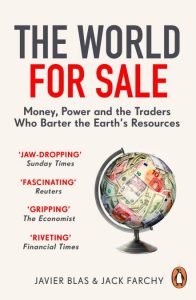I had no idea that the (very few) people who sell commodities (oil, steel, grains, etc.) have so much influence.
I am NOT talking about the producers of oil, steel, agri-products, and other commodities. I am talking about the few companies that facilitate transactions between the producers and buyers of commodities.
> There are very few of them.
> They are extremely wealthy.
> And they often play a more critical role in world affairs than presidents, armies, and revolutions.
Commodity traders saved tyrants, changed governments, and even printed their own money.
When the inflation in Zimbabwe exceeded a million percent per year, the government could not print the banknotes fast enough.
Cargill, a commodity trading firm, could not obtain enough Zimbabwean cash to pay the 20,000 farmers it was buying cotton from. So it printed its own money.
The scheme was very simple. Cargill electronically deposited about a trillion Zimbabwean dollars (at the time, about a million U.S. dollars) in an account at a local bank. It then printed Cargill “monopoly” dollars and instructed the bank to pay a million Zimbabwean dollars for every Cargill dollar brought to the bank by farmers. It also promised to electronically deposit more Zimbabwean dollars into the account when the bank’s payouts to the farmers exceed the initial deposit.
Unexpectedly, the Cargill “monopoly” money became so popular that it started circulating alongside the Zimbabwean dollar. So the farmers, instead of bringing the Cargill dollars to the banks after being paid by Cargill, started using the money to pay for food, clothing, etc.
By the time the Cargill dollars were returned to the bank, often months later, the hyperinflation made the Zimbabwean dollar much cheaper, and Cargill was making a killing by paying for its “monopoly” dollars in now-worthless Zimbabwean dollars.
According to the book’s author, commodity traders also effectively saved Putin in 2014-2016 when the sanctions imposed by western governments brought the Russian economy to its knees. The commodity traders’ willingness to buy Russian oil provided Putin with much-needed cash to survive the toughest times.
